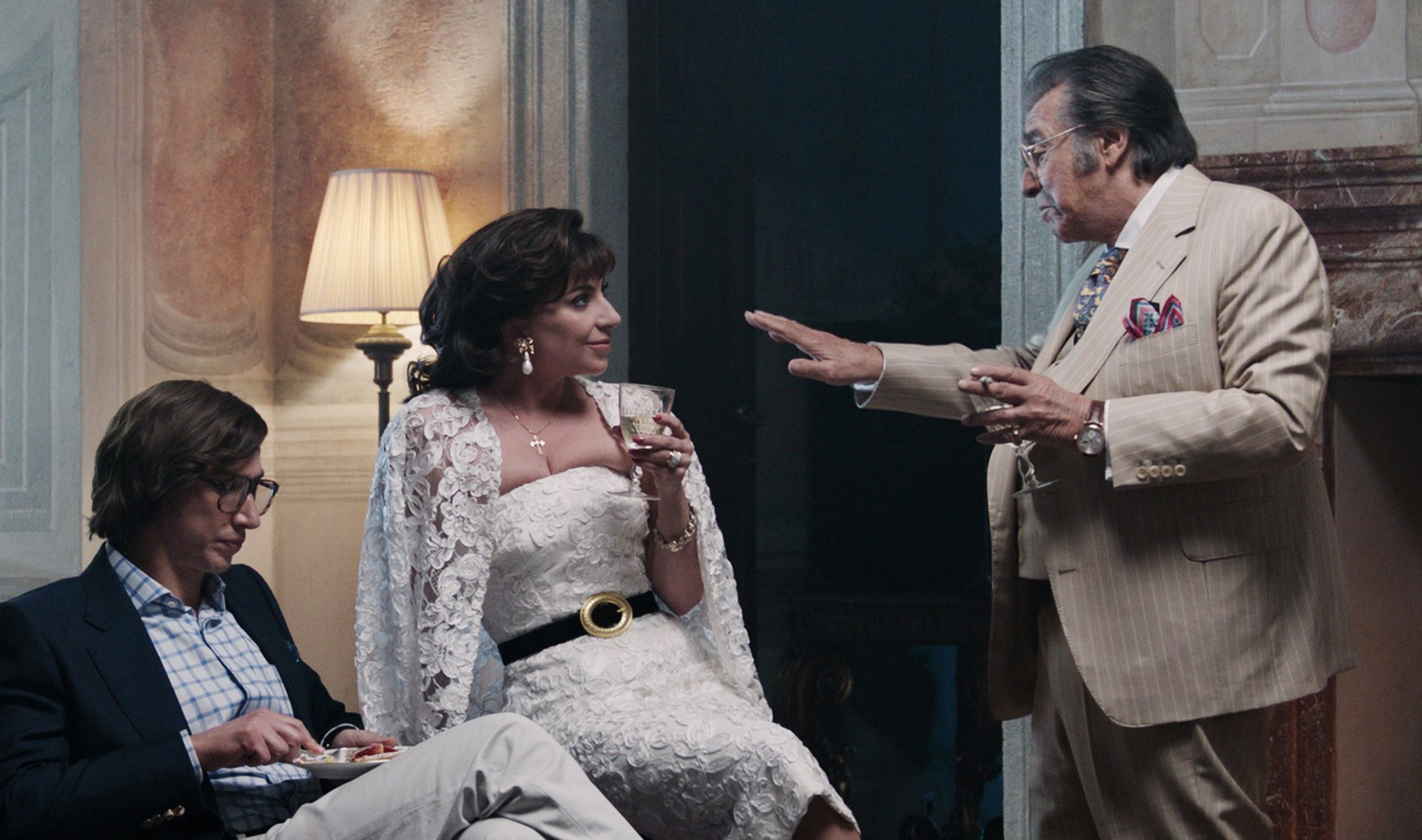My first Oscars essay presented Wes Anderson, the Hollywood dandy’s Francophilia, The French Dispatch, and gentle criticism of liberal intellectual pretense. The 2022 Oscar contenders also include an examination of American Italophilia—veteran Ridley Scott’s House of Gucci, as full of today’s stars as Anderson’s movies are of yesteryear’s. Lady Gaga stars as the social climber-turned-murderess Patrizia Reggiani; Adam Driver as Maurizio Gucci, the fashion-business heir husband who left her and whom she paid someone to murder; and Jared Leto as his cousin Paolo Gucci. Salma Hayek plays the lady who helped hire the murderer, and the aged Al Pacino and Jeremy Irons play brothers Rodolfo and Aldo, who made Gucci a global luxury.
House of Gucci is designed like a parody of The Godfather and the entire subsequent generation of movies, which introduced America to Italian concerns with family and honor, passion and decadence, splendor and crime. That’s all over, of course; Americans no longer fantasize about Italy, but decadence and splendor are still important in Hollywood and America. It’s all over but the parody, that is, and Scott, a Brit uninterested in Italians, to judge by his career, seems to enjoy mocking the epic ambition of those stories and their insistence on tragedy.
This time it’s Milan, not New York, and the family business is fashion, not crime; the reputation is accordingly much better, but there’s no toughness, no mystery, no authority; an impressive influence attaches to the Gucci name, but it is a very worthless thing, which makes for a good poetic substitute for bragging. Altogether, Scott wants to show that that emptiness is also morally rotten, even repulsive at times. The suits are impressive, yes, but they are empty. In The Godfather, Don Vito is a ruler with a tradition behind him; in House of Gucci, the two generations we see are clowns played for laughs, a family that self-destructs out of pettiness, caprice, and self-importance.
Don Vito’s combination of majesty and cunning is split in the parody. Jeremy Irons makes a caricature of the splendor of aristocracy, dressing like an Edwardian gentleman and affecting class contempt through every gesture, grimace, and the occasional pause to swallow his revulsion at everything new in the demotic 1980s. But it turns out he’s irrelevant to the plot; the world simply passes him by—Al Pacino is the more enterprising and worldly of the two, as he heads Gucci in America. He, in turn, makes a caricature of the family aspect of aristocracy, from the Tuscan countryside roots to the avuncular speeches and tender generosity for the future of the family—namely, his nephew Driver and his colorful wife Gaga. It turns out he’s also corrupt, cheats on his taxes, treats his son like a silly child, and comes to a sorry end. The story encourages us to believe these two very successful men, Rodolfo and Aldo, could never have amounted to anything, since it abstracts the family from the business.
House of Gucci treats the old with contempt, but does much worse to the young. Leto plays Paolo Gucci in the most unsympathetic way possible. He’s not only the victim of the contempt of his elders, but his ambitions to design are also treated as a mere nothing, a distraction from the important stuff, which is his ugliness, his thin voice and absurd gestures, his weak character and halfhearted resentments. He is, you guessed it, the Fredo of the show—he imitates the elders who despise him, and does so badly, but reveals in the process their own ugliness. He is nevertheless a victim we are encouraged to believe deserves even worse than he gets as he plays his part in the family intrigue.
The Michael Corleone role goes to Driver, perhaps the most impressive actor of his generation, wasted in this clown show as much as everyone else. He begins a shy law school student trying to escape aristocratic opulence, fearful of its obsession with the past because he knows it makes for cruelty in the present. Like Michael, he finds himself a local girl, which conceals his calculating mind and unpleasant temper. The pushy wife pushes him back to his family and into the business, which he ends up taking over ruthlessly—like Michael, by destroying any family love, to say nothing of anything sacred.
It’s somewhat funny to see Gaga be manlier than real-life Marine Corps veteran Driver for a while—we even get to see him iron the clothes in a domestic scene. She seduces him, gets him to marry, and even intrigues her way to put him in charge of the business. But aside from the elite media obsession with girlboss roles, it makes no sense to have the story told from her point of view; she’s not just the worst actor in the cast, but also plays the least interesting character, who knows nothing of glamour and its global reach, less still of the crisis it portends. Yet she’s the image of democracy—an independent woman, mind of her own, tough, direct, and although she’s an outsider among the elites, a striver. And I’d bet she gets an Oscar nomination,
The movie is very long, two hours and a half, and though every scene is directed with an easy mastery we’ve come to expect from Scott, parody should be much shorter than this. The first half deals with the rise of the Gaga-Driver odd couple, their love and their business triumph, but by the time it all begins to sour up and the second half begins to shows their ugly end, there’s no reason anymore to pay attention. The change of generations is a change from a striving for greatness that proves empty, a mere nostalgic embrace of the past, to irremediable mediocrity, which lacks interest.
Worse, parts of the movie are unbearably boring. Cutting a sex scene between Driver and Gaga to the “Libiamo, ne’ lieti calici” aria from Verdi’s La Traviata, and cutting their wedding scene to George Michael’s Faith—it’s not only bad taste; it’s obnoxious. Scott makes the entire movie about ironic reflections on media, ruining any interest in the plot in the process. He wants you to notice that the famous aria has been so overused that any interest in the opera itself has been destroyed. I think he went so far as to use a Pavarotti recording, to insist on the decadence created by popularity in the age of TV, with instantaneous worldwide broadcasting on repeat. As for Faith, it’s not just a juxtaposition of high and low; it’s a remark on our media degeneracy: They’re in church, hence faith, but with a twist—a hip, modern, and fun scene. He’s very clever in his criticism, but it’s a pain to watch.
Scott seems to be complaining that when mediocrity was glamorized to the point of celebrity worship, this nonsense became authoritative and corrupted art. He made this unfunny farce, getting his actors to offer a tabloid view of Italy since the ’70s, to prove we have no tragedy, only sordid scandals, more ridiculous than fearful, and ultimately unimportant. And those actors don’t particularly look like the real Guccis, except maybe Pacino. They don’t talk or act like them—they’re crass caricatures, intended to abuse clichés of characterization, as if to say, if we can have nothing great, we might as well have misery. The movie’s message is gloom: Cinema is dead, because the audience was corrupted, as the ideas of romance to which they’ve succumbed make everything into a commercial. Scott himself has been making commercials for more than a generation, after all, selling luxury and exclusivity to the middle classes while debasing for their enjoyment the old sacred things. Even the two sacrilegious jokes—Gaga signing herself saying “Father, Son, House of Gucci” (an improvisation) and Driver calling Gucci the Vatican of fashion in an interview—have no power, either as sacrilege or humor.
The good press House of Gucci has received suggests Hollywood and media elites more broadly don’t see that they are the object of his mockery. The Guccis are Scott’s vision of our debased elites, ugly while pretending to be beautiful, as the movie’s conclusion suggests by connecting Gucci to transnational corporations, on the one hand, and to Anna “Devil Wears Prada” Wintour, on the other. As with other satires in our times, our elites aren’t even smart enough to know they’re being mocked.

